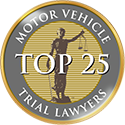
If you are injured in a car wreck caused by another driver, you will likely find yourself with a wide range of bills and out of pocket costs. Your vehicle will need repairs, you may have to rent a car in the interim, you will have medical bills and prescription bills, and you may miss time from work as well.
Insurance Coverage Overview
When the crash is not your fault, it is not fair for you to have to pay for any of those bills, and that is where insurance and the civil justice system come into play. All drivers are required by law to carry at least a minimum amount of liability insurance coverage on their vehicles in the State of Georgia.
Unfortunately, the minimum coverage amount is only $25,000.00. Therefore, an at-fault driver’s auto liability insurance covers at least some of the bills that result from a car accident.
Liability insurance policies on motor vehicles in Georgia offer coverage for both property damage (vehicle repairs or replacement if the vehicle is deemed a total loss) and personal injuries (including pain and suffering and lost wages) that may result when the insured party causes a vehicle crash. When an insured person causes a crash, their insurance company is required by law to conduct a prompt investigation into the claim to determine if their insured is at fault, and, if they are, to pay the bills that can reasonably be shown to have resulted from the crash.
The good news is the minimum coverage limits apply separately for property damage and personal injury. For example, a policy may provide $25,000 for property damage and an additional $25,000 for injuries.
In such an event, the most the insurance company would have to pay to repair or replace your damaged vehicle is $25,000. Likewise, the most they would have to pay toward your medical bills and other out of pocket injury-related expenses is $25,000.
If your bills exceed $25,000, you would be responsible for any costs beyond the limits of liability insurance coverage unless you have what is known as Uninsured or Underinsured Motorist (UM) coverage on your own insurance policy. (For more info on UM coverage, click here).
Once you know the limits of insurance coverage available to you, the next question becomes which of your bills must the insurance company pay when their insured driver causes a crash? The general rule is the insurance company for the driver who caused the crash must make you “whole.” When you have been involved in a car crash, what does it take to make you “whole” again or put you back in the position you were in right before the crash?
Atlanta Personal Injury Lawyer
If you are reading this article, you are likely most interested in knowing what you are entitled to in a car accident for your injuries. For that reason we will start with a look at the various items of damages you may be entitled to from the insurance company(s).
Medical Bills
If you are injured in a car accident, there are several different items of damages you are entitled to from the insurance company. Making you whole here means the insurance company pays your medical bills even if you have health insurance which will also pay toward your bills.
The auto liability insurance company (and your UM if applicable) is responsible for paying the entire amount of all medical bills resulting from the crash, not just your out of pocket co-pay amounts if you happen to have health insurance. BE CAREFUL HERE. We have heard of insurance adjusters telling people insurance will only cover what you pay out of pocket. NOT TRUE!
The liability insurer does not get to benefit from the fact you have health insurance to reduce your medical bill, and they have to pay you what the full amount of your medical bill would have been had you not had health insurance. You can find this amount by obtaining your medical bill straight from the doctor’s office or hospital instead of getting it through your health insurer which may only show the reduced amount they paid or the copay you paid.
The same is true of your pharmacy bills for medication and for any other out of pocket costs you incur for medical treatment of the injuries you sustained such as over-the-counter medication, braces, or splints that you purchased on your own. As long as it was reasonably necessary to treat injuries caused solely by the crash then the insurance company has a legal obligation to pay you those amounts as part of your personal injury claim.
Lost Wages
The next item of damage you have a right to if you have a loss, is any lost wages for time missed from work. Even if you did not actually lose any salary because your job affords you paid leave that you used while you were injured and unable to work, the liability insurer is still required to pay you for the time you missed from work as though you did not have paid leave.
Just like the insurer cannot benefit from the fact you have health insurance to help pay your medical bills, they also cannot benefit from the fact your employer offers you paid leave to cover the time you were unable to work. The leave you used is no longer available to use for future illness, and the insurance company is required to compensate you for that as “lost wages” even though you did not actually lose any money.
Pain and Suffering
Lastly, making you whole also includes compensating you for your pain and suffering. If, for example, you break your leg in the crash, simply paying your medical bills and your lost wages does nothing to make you whole for the fact you were unable to walk normally for a couple of months and your previously healthy leg was painful and unusable for that time period.
This is what pain and suffering compensation is designed to cover. Calculating fair compensation for pain and suffering is the most difficult component of any personal injury claim because there is no set formula for converting your pain and disruption of normal life due to your injuries into dollars and cents.
Most people would give anything to simply go back to the way they were before the crash. It is impossible to come up with any dollar amount that makes them feel whole again for pain and suffering that may be long-lasting or even permanent.
Pain and suffering damages are usually the battleground where attorneys and insurance companies fight the most because unlike medical bills and lost wages, which are fixed amounts, there is nothing fixed about pain and suffering damages. They are unique to the person who experienced them and no two cases are exactly alike.
Ultimately, in our civil justice system, your pain and suffering damages are worth whatever a jury of your peers after a lawsuit and civil trial decides they are worth. Generally, they are calculated by multiplying the total of your medical bills and lost wages by some multiple.
In egregious cases, a jury may calculate pain and suffering by multiplying your bills by 10 or more while in minor cases a jury may award little to nothing for pain and suffering. It is impossible to predict what a jury will do, but using historical data from previous verdicts, insurance companies and personal injury attorneys can make educated guesses as to the likely value of your pain and suffering award if you were to take the case to trial and will use that to guide their settlement negotiations.
Property Damage Claim
The first thing you are entitled to in a car accident in Georgia is reimbursement for the damage caused to your vehicle. This means either full repair of the vehicle to the condition it was in before the wreck or if totaled, payment to you of the value of the vehicle. If repaired, you would have an additional right to payment of the difference in the value of the vehicle before the wreck and after repaired.
Vehicle Repairs
Before the crash your vehicle probably was not damaged and was more valuable than it is now after the crash. Making you whole in this context means the insurance company must pay to repair your vehicle and restore it to the good working condition it was in prior to the crash.
They also must pay you for the fact that because your vehicle has now been wrecked it is likely worth less money than it was when it had never been wrecked. That difference is called diminished value.
The newer your vehicle was and the more extensive the repairs were, usually the more significant your diminished value will be. Wrecking a 15-year-old non-classic car diminishes the value far less than wrecking a brand new, fully loaded car.
While your vehicle is being repaired, making you whole would seemingly also mean providing you with a temporary replacement vehicle. Generally, insurance companies will pay for a rental car for a set number of days while your vehicle is being repaired, but not every insurance company will do this if their policy does not cover it.
If the at-fault driver’s insurance only covers repairs but does not cover a rental car you may be able to obtain rental car coverage through your own insurance policy.
Vehicle Replacement
If your vehicle cannot be repaired or the repairs and diminished value combined would cost more than a certain percentage of the vehicle’s market value, the insurance company may deem your vehicle a total loss, which is commonly known as your vehicle being “totaled.” If your vehicle is totaled, making you whole under the law does not mean providing you with a new or comparable vehicle.
Making you whole under the law means the insurance company must pay you the fair market value of your vehicle in the condition it was in prior to the crash, which theoretically would enable you to purchase the exact same vehicle again if you could find it on the market. The insurance company also must pay you for any personal property you had in the vehicle that was damaged or destroyed during the crash.
Unfortunately, this means there may be a gap between what you still owe on the vehicle and what the insurance company must pay you for your totaled vehicle. Again, the insurance company, unfortunately, has no responsibility to pay off your vehicle to cover this gap. You would be left having to pay the rest owed on the vehicle even though it was totaled.
Conclusion
The insurance company is required to pay all of these categories of damages to make you whole if you are involved in a car crash caused by another driver. The best way to ensure you get all of the compensation you deserve after a car crash is to contact an experienced personal injury attorney and schedule a consult to discuss your case before you speak to anyone at the insurance company.
To learn more about the compensation you are entitled to after a car crash contact the experienced Atlanta car accident attorneys at Spaulding Injury Law. Call our Atlanta office today at (770) 744-0890 for a free consultation.









